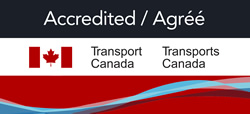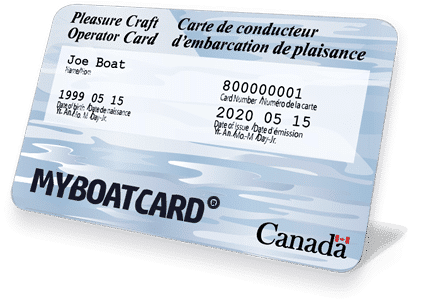CANADA Boating Laws and Regulations
Stay up-to-date on Canada’s boating laws and regulations.
Introduction to Boating Laws and Regulations in Canada
In Canada, anyone operating a recreational boat must comply with Canada’s boating laws and regulations.
The Canada Shipping Act 2001 is the principal legislation governing recreational boating in Canada. It is the responsibility of every boater to familiarize themselves with these laws and regulations and to ensure that they are operating their vessel safely and responsibly at all times.
These laws and regulations are in place to ensure the safety of all boaters and to protect the environment.
The law applies to vessels of all sizes and all operators within Canadian waters, including both visitors and those operating on private property.
Table of Contents
Can I operate a boat without a boating license in Canada?
In Canada, all operators of all ages must have their Pleasure Craft Operator Card (boating license), or other proof of competency on board to operate any type of pleasure craft equipped with a motor (even electric motor), including personal watercraft.
This includes all types of motorized boats, no matter their size or the horsepower of the engine (including small boats with electric trolling motors.) Failing to produce proof of competency to an enforcement officer in Canada may result in a fine of $250.
This regulation is set out in Section 4 of the Transport Canada Competency of Operators of Pleasure Craft Regulation (COPCRs). This regulation does not apply to operators in the Northwest Territories and Nunavut.
Proof of competency can be any of the following:
- A Pleasure Craft Operator Card (PCOC), that you received after passing a boating safety course approved by Transport Canada;
- A certificate that states you have completed a boating safety course in Canada before April 1, 1999;
- A completed and signed boat rental safety checklist (applicable only for the rental period); or
- A specified marine certificate or equivalency recognized by Transport Canada.
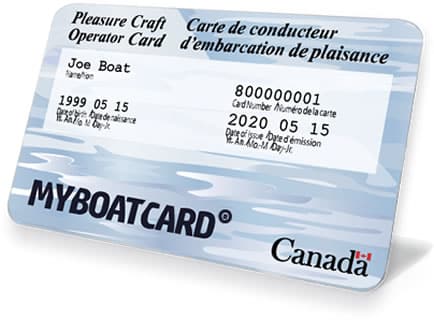
If you have a Pleasure Craft Operator Card as proof of your competency, you must have the original card on board the vessel. Copies (other than a copy of your temporary PCOC) or electronic versions of the card will not be accepted as valid proof of competency.
If you lose or damage your boating license (PCOC) you will need to order a replacement card before you can legally operate a recreational vessel again. Also, if you change your name or address you will need to contact your PCOC provider to update it on the Transport Canada database.
Your boating license (PCOC) does not expire. It’s good for life.
Do I need a boating license in Canada if I am just visiting?
If you are a non-resident visiting Canada with your boat, you are not required to carry proof of competency on board as long as your boat is in Canada for less than 45 consecutive days.
Is my Canadian boating license recognized in the US?
The Canadian boating license, also known as a Pleasure Craft Operator Card (PCOC) is recognized in the United States as equivalent to their NASBLA-accredited Boating Safety Education Certificates.
Canadian boaters who have completed their boating safety course and obtained a PCOC can operate a vessel in the U.S. waters without additional certification.
Canada will accept boating education cards issued by US states that meet NASBLA requirements, as proof of competency.
Required Documentation
In Canada, all boaters must have the following:
- Proof of Competency (PCOC);
- Pleasure Craft License – if operating a vessel with 10 hp (7.5 KW) or more; and
- Personal Identification.
Pleasure Craft License
All pleasure craft powered by an engine or engines of 10 hp (7.5 KW) horsepower or more, including Personal Watercraft (PWC), must be licensed. Alternatively to licensing a boat, it can be registered with Transport Canada.
A pleasure craft licence is a document that provides your boat with a unique identification ID number. The license is valid for a period of 10 years, beginning the day it was issued, transferred or renewed. A license can be obtained for free from the Pleasure Craft Licensing Centre.
The Pleasure Craft Licensing System enables Search and Rescue personnel to access details about your boat, providing a critical resource in emergency situations.
Pleasure craft license paperwork must be kept on board when the boat is being operated.
Age and Operator Restrictions in Canada
In Canada, the Transport Canada TP 14350E Vessel Operation Restriction Regulations (VORRs), set the age and horsepower restrictions that apply to all pleasure craft operators. These restrictions are outlined below.
- UNDER 12
Operators under 12 years of age who are not directly supervised by a person 16 years of age or older may only operate a pleasure craft propelled by a motor of no more than 10 hp (7.5 kW). - BETWEEN 12 AND 15
Operators who are 12, 13, 14, or 15 years of age who are not directly supervised by a certified person 16 years of age or older may only operate a pleasure craft propelled by a motor of no more than 40 hp (30 kW). - 16 OR OLDER
Operators that are 16 years of age or older can operate any pleasure craft regardless of horsepower. - Only operators that are 16 years of age or older may operate a personal watercraft (PWC) without supervision.
Note:
– Regardless of age, all pleasure craft operators require proof of competency to be carried on board.
– The above age restrictions do not apply in the Nunavut and Northwest Territories.
Drinking Laws and Boating Canada
Under the Criminal Code of Canada, it is an offence to operate a boat if you are impaired by alcohol or drugs (including cannabis). Alcohol consumption is linked with more than 40% of all boating deaths in Canada.
The same rules that apply to drinking and driving on land also apply to boating.
If your Blood Alcohol Concentration (BAC) exceeds 80mg or 0.08%, you are considered over the legal federal limit for operating a boat. Additionally, it is illegal to operate a boat if you have a blood concentration of 2-5 nanograms (ng) of tetrahydrocannabinol (THC) per ml of blood, or a combination of 50 mg of alcohol per 100 ml of blood and 2.5 ng of THC per ml of blood.
Boat passengers may legally consume alcohol within accepted limits only if the boat:
- has permanent cooking facilities;
- has a permanent sleeping area;
- has a permanent toilet (a portable toilet does not count); and
- is moored to the dock, at anchor or beached (not in motion).
It’s also important to note that consuming alcohol on a boat can be dangerous, as alcohol can impair your judgment and make it more difficult to react to unexpected situations on the water.
If you are caught operating a boat while under the influence of alcohol or drugs, you may be subject to fines starting at $230 and/or imprisonment.
Fine for drinking on a boat:
- $230 – if drinking alcohol on a boat that does not have a sleeping area, cooking facilities or toilet.
Fines for operating a boat while impaired:
- 1st offence: Mandatory minimum $1000 fine; Maximum 10 years imprisonment
- 2nd offence: Mandatory minimum 30 days imprisonment; Maximum 10 years imprisonment
- 3rd offence: Mandatory minimum 120 days imprisonment; Maximum 10 years imprisonment
Careless Operation of a Boat in Canada
It is illegal to operate a vessel carelessly in Canada, without due care and attention, or without considering the impact on other people. This type of behavior is subject to fines under the Contraventions Act.
Examples of careless operation include:
- Jumping the waves of another vessel at an unreasonably close distance;
- Weaving through congested traffic at more than a slow speed;
- Swerving at the last possible moment (i.e. playing chicken ); and
- Operating a boat at a speed higher than necessary to maintain steerageway when near swimmers, non-powered vessels or cautionary buoys.
Dangerous Operation of a Boat in Canada
Operating a vessel in a dangerous manner is not only unsafe; it is illegal. Under the Criminal Code of Canada, dangerous driving offences that result in bodily harm or death can result in imprisonment of 10 years or more. Operating a boat at high speed near swimmers classifies as dangerous operation of a vessel.
Speed Limits while Boating in Canada
The Canadian Collision Regulation (Rule 6) states that all boaters must operate at a safe speed at all times in order to avoid collision and/or adversely affecting any other vessel (i.e. dredging, towing, kayaking, etc.).
A safe speed is a speed that allows the operator enough time to take proper and effective action to avoid a collision. The faster a boat travels, the greater the distance required for it to stop, and the less time available for the operator to react to a change in conditions. Be very careful when boating where visibility is poor, such as when entering or exiting a fog bank.
According to the Collision Regulations, to determine the safe speed for your vessel, you should take into account all of the following factors:
- Your ability to see ahead – slow is the only safe speed in fog, mist, rain, and darkness;
- Current, wind, and water conditions;
- How quickly your boat can change direction;
- How many and what types of vessels are near you; and
- The presence of navigational hazards such as rocks and tree stumps.
If you already have your PCOC and want to brush up on your boating safety knowledge, why not check out the free boating resources, which include a free boating license practice test.
Boat Safety Equipment
If you are operating a boat in Canada you must have certain items of equipment on board at all times. You are responsible for keeping all necessary safety equipment on board at all times even if the boat is rented, chartered or borrowed.
These items are necessary for the safety of the passengers and the vessel, and failing to have them on board could result in fines or other penalties.
The Small Vessel Regulations sets out a list of the minimum safety equipment that all vessels operating in Canadian waters must have on board. The required equipment varies depending on the length and type of vessel. Click here for a full list of Boat Safety Equipment required in Canada.
Your safety boating equipment must be:
- In good working order;
- Maintained and/or replaced according to the manufacturer’s instructions; and
- Readily accessible in case of emergency.
Enforcement in Canada
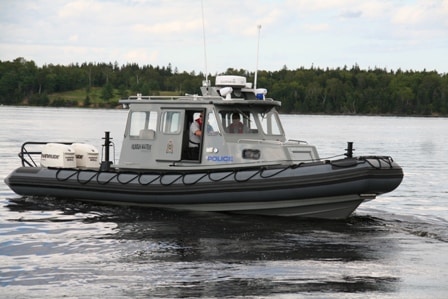 An enforcement officer, such as a member of the Royal Canadian Mounted Police, a provincial or municipal police force, or other local authority, has the authority to inspect your boat and monitor your boating activities to ensure that you are complying with applicable requirements.
An enforcement officer, such as a member of the Royal Canadian Mounted Police, a provincial or municipal police force, or other local authority, has the authority to inspect your boat and monitor your boating activities to ensure that you are complying with applicable requirements.
These officers may also direct or prohibit vessel movement for the purpose of maintaining public safety. If you fail or refuse to stop and comply with requests from law enforcement, you may be subject to fines and/or imprisonment
Operators of vessels who are required to have a Pleasure Craft Operator Card (PCOC) must have the physical card or temporary PCOC on board and make it available for inspection by an enforcement officer. Failing to do so can result in a fine.
Canada Boating Fines
Boating offenses that are subject to fines under the Contraventions Regulations.
Some of these fines include:
$350 – Operating a boat in a careless manner
$350 – Altering or removing the serial number on the hull of the vessel.
$250 – Operating a vessel without a pleasure craft operator card or proof of competency on board
$250 – Operating a vessel while underage
$250 – Not having a spotter or seating for the passenger in tow
$200 – Operating a vessel without the required boating safety equipment
$200 – Not having enough approved PFDs or lifejackets on board (+ $100 for every PFD/lifejacket missing)
Canada Boating Laws : FAQ’s
What is required to operate a boat in Canada?
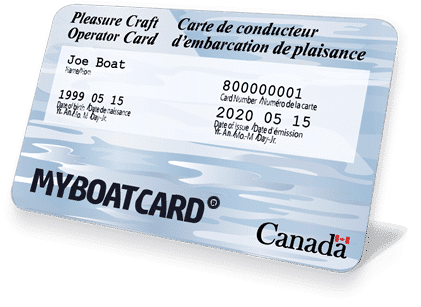 In Canada, all operators of recreational-powered watercraft, regardless of its size or power, must carry proof of competency on board at all times. The most common proof of competency is a Pleasure Craft Operator Card (PCOC).
In Canada, all operators of recreational-powered watercraft, regardless of its size or power, must carry proof of competency on board at all times. The most common proof of competency is a Pleasure Craft Operator Card (PCOC).
Can you drink on a boat in Canada?
You can legally consume alcohol within accepted limits only if the boat:
- has a cooking and sleeping area;
- has a standalone washroom (a portable mobile toilet does not count);
- is moored to the dock or is at anchor.
Under the Criminal Code of Canada, it is an offense to operate a boat if you are impaired by drugs (including cannabis) or alcohol.
Can a 14 year old drive a boat in Canada?
Operators of pleasure craft who are 14 years of age and are not directly supervised by a certified person 16 years of age or older may only operate a pleasure craft propelled by a motor of no more than 40 hp (30 kW).
Who enforces boating laws in Canada?
An enforcement officer, such as a member of the Royal Canadian Mounted Police, a provincial or municipal police force, or other local authority enforces boating laws in Canada.
Can police search your boat in Canada?
An enforcement officer has the authority to stop, board and inspect your boat and monitor your boating activities to ensure that you are complying with applicable requirements.
When operating a boat what must you do at all times?
When operating a boat or jet ski in Canada you must:
- Operate in a safe manner
- Take all necessary action to avoid a collision
- Avoid endangering the safety of other persons
- Keep a proper lookout
- Maintain a safe speed
What is the fine for drinking on a boat in Canada?
$230 is the fine for drinking on a boat in Canada if the boat does not have a sleeping area, cooking facilities, or toilet.
Be Safe, Get Certified.
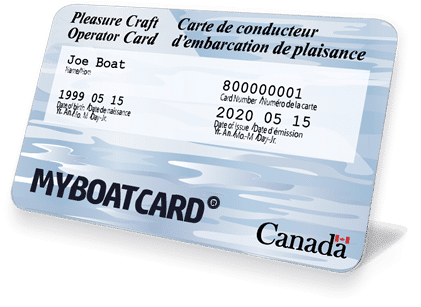 It is illegal to operate a powered boat in Canada without a boating license (or other proof of competency), and the fines for doing so can be significant. Additionally, obtaining a boating license is a good way to ensure that you are operating your boat safely and responsibly.
It is illegal to operate a powered boat in Canada without a boating license (or other proof of competency), and the fines for doing so can be significant. Additionally, obtaining a boating license is a good way to ensure that you are operating your boat safely and responsibly.
By completing a boating safety course and obtaining your boating license, you can gain the knowledge and skills needed to operate a boat safely, protect yourself and others, and avoid costly fines. If you want to test your knowledge – why not try out the free boating license practice test.
With the convenience and affordability of MyBoatCard.com’s online course, there is no reason not to get your boating license today.
Join the over 2 million certified Canadians, and get your boating license today!
TRY IT. FREE.
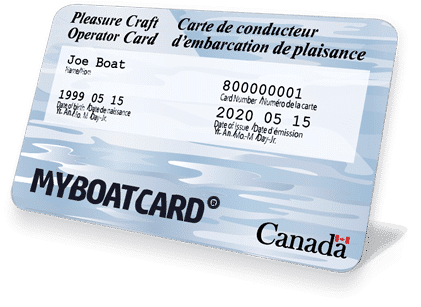
Transport Canada approved Boater Safety Course is free.
Take the course in your own time and risk free.
Other providers try to get you to pay upfront before you even have a chance to try out their course!

OVER
2,000,000
CERTIFIED
CANADIANS
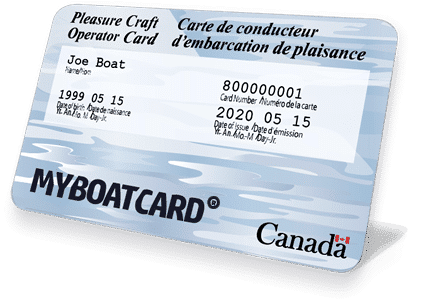
TRANSPORT CANADA.
ACCREDITED.
MyBoatCard.com® is accredited by Transport Canada to deliver boating safety courses and administer tests for the issuance of Pleasure Craft Operator Cards, including replacement cards, under the Competency of Operators of Pleasure Craft Regulations.
